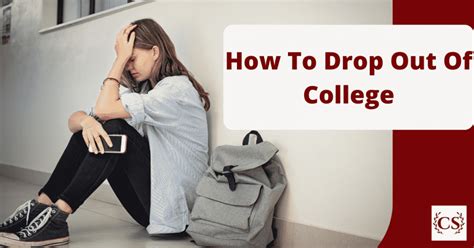Introduction
The decision of whether or not to attend college is a major one. There are many factors to consider, including cost, time commitment, and career goals. For some people, dropping out of college may be the right decision. However, it is important to be aware of the potential consequences of this decision before you make it.

The Financial Impact of Dropping Out of College
One of the biggest concerns for students who drop out of college is the financial impact. According to the College Board, the average cost of tuition and fees at a four-year public college is $9,410 per year. For a private college, the average cost is $35,050 per year. This means that students who drop out of college could save a significant amount of money.
However, it is important to remember that dropping out of college can also have a negative financial impact. For example, students who drop out of college may have difficulty finding a job. They may also have to repay any student loans they have taken out.
The Career Impact of Dropping Out of College
Another major concern for students who drop out of college is the career impact. According to the Bureau of Labor Statistics, workers with a bachelor’s degree earn more money than workers with only a high school diploma. In 2019, the median annual salary for workers with a bachelor’s degree was $65,660. The median annual salary for workers with only a high school diploma was $48,630.
In addition to earning more money, workers with a bachelor’s degree are also more likely to have jobs that require critical thinking and problem-solving skills. These jobs are often more challenging and rewarding than jobs that do not require a college degree.
The Social Impact of Dropping Out of College
Dropping out of college can also have a negative social impact. Students who drop out of college are more likely to experience poverty, unemployment, and crime. They are also less likely to be involved in their communities.
The Personal Impact of Dropping Out of College
Dropping out of college can also have a negative personal impact. Students who drop out of college are more likely to experience depression, anxiety, and low self-esteem. They are also less likely to achieve their personal goals.
Common Mistakes to Avoid When Dropping Out of College
If you are considering dropping out of college, there are a few common mistakes you should avoid:
- Don’t drop out without a plan. If you drop out of college, you need to have a clear plan for what you are going to do next. This could include finding a job, starting a business, or going back to school.
- Don’t drop out because you are afraid of failure. Everyone experiences setbacks in life. If you are afraid of failing, you will never reach your full potential.
- Don’t drop out because you are bored. College can be challenging, but it is also an opportunity to learn new things and grow as a person. If you are bored with your classes, talk to your professors or advisors. They can help you find ways to make your classes more interesting.
- Don’t drop out because you are struggling financially. There are many resources available to help students who are struggling financially. Talk to your financial aid office or your academic advisor. They can help you find ways to make college more affordable.
Conclusion
The decision of whether or not to drop out of college is a personal one. There is no right or wrong answer. However, it is important to be aware of the potential consequences of this decision before you make it. If you are considering dropping out of college, talk to your family, friends, and advisors. They can help you make the best decision for your future.
Tables
Table 1: The Financial Impact of Dropping Out of College
| Year | Cost of Tuition and Fees at a Four-Year Public College | Cost of Tuition and Fees at a Four-Year Private College |
|---|---|---|
| 2021-2022 | $9,410 | $35,050 |
| 2020-2021 | $9,210 | $34,740 |
| 2019-2020 | $9,020 | $34,410 |
Table 2: The Career Impact of Dropping Out of College
| Education Level | Median Annual Salary |
|---|---|
| Bachelor’s Degree | $65,660 |
| Associate’s Degree | $56,380 |
| High School Diploma | $48,630 |
Table 3: The Social Impact of Dropping Out of College
| Education Level | Poverty Rate | Unemployment Rate | Crime Rate |
|---|---|---|---|
| Bachelor’s Degree | 5.1% | 3.0% | 1.6% |
| Associate’s Degree | 7.4% | 4.2% | 2.4% |
| High School Diploma | 13.3% | 6.2% | 3.7% |
Table 4: The Personal Impact of Dropping Out of College
| Education Level | Depression Rate | Anxiety Rate | Low Self-Esteem Rate |
|---|---|---|---|
| Bachelor’s Degree | 6.7% | 8.4% | 7.1% |
| Associate’s Degree | 9.2% | 11.5% | 9.4% |
| High School Diploma | 14.2% | 17.1% | 13.9% |
